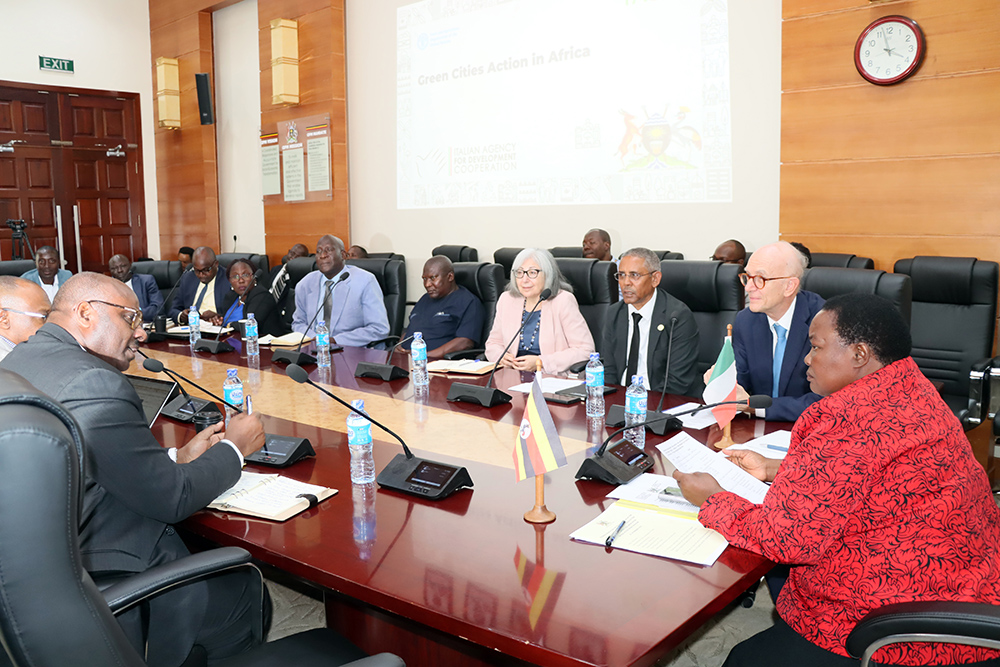Kampala, Hoima cities to benefit from sh627b Italian green cities initiative
“Today marks an important milestone in the partnership between Uganda and Italy, and we extend our deep appreciation to the Government of Italy and the Italian Ambassador to Uganda for their unwavering support and collaboration,” Prime Minister Robinah Nabbanja, who presided over the agreement signing ceremony, said.
The Prime Minister, Robinah Nabbanja, and the Italian Ambassador to Uganda, Mauro Massoni, exchange signed agreements at the Office of the Prime Minister in Kampala.
KAMPALA - The cities of Kampala and Hoima are set to benefit from a multi-billion shilling green cities project bankrolled by the government of Italy, New Vision Online has learnt.
According to reports reaching our desk, the development follows the governments of Uganda and Italy signing a letter of intent under the Green Cities Initiative, worth Euros 150 Million (about shillings 627 billion).
This co-operation reflects the shared commitment of the two governments to building cleaner, healthier and more resilient urban environments for current and future generations.
“Today marks an important milestone in the partnership between Uganda and Italy, and we extend our deep appreciation to the Government of Italy and the Italian Ambassador to Uganda for their unwavering support and collaboration,” Prime Minister Robinah Nabbanja, who presided over the agreement signing ceremony, said.
Nabbanja noted that Italy’s engagement under the Mattei Plan for Africa has demonstrated a strong commitment to supporting African countries in climate resilience, renewable energy, sustainable cities, and the circular bio‑economy.
“We also thank the Food and Agriculture Organisation (FAO) for effectively utilising the project preparatory grant and for conducting extensive assessments in Kampala and Hoima. These efforts identified two strategic priority areas: Sustainable waste management and the upgrading of urban food markets. These areas represent the most urgent needs facing our rapidly growing urban centres,” Nabbanja said.
According to Italian Ambassador to Uganda Mauro Massoni, the Mattei Plan for Africa is an Italian government initiative led by Prime Minister Giorgia Meloni to establish a new framework for co-operation with African countries, focusing on sustainable development, energy, agriculture and education.
“The plan aims to create equitable partnerships, attract investment, and foster stability, moving beyond traditional aid models towards joint projects,” Massoni said.
The Initial funding for all African countries is €5.5 billion, and the plan involves collaboration with African nations, the African Development Bank, and other international partners like the EU's Global Gateway. 
The Prime Minister of Uganda, Robinah Nabbanja, chairing a meeting before the signing of the letter of Intent at OPM in Kampala.
Statistics indicate that Uganda’s cities continue to face mounting waste management challenges, with Kampala alone producing an estimated 2,500 tons of waste daily, more than 70% of which is organic.
Across all urban areas, the country generates over 8,000 tonnes of waste daily, yet only 40–50% is collected.
These pressures strain drainage systems, create environmental hazards, and increase the cost of urban living. Through this partnership, we are taking decisive steps to reverse this trend.
The selection of Kampala and Hoima as pilot cities offers Uganda a unique opportunity to demonstrate scalable models for green, inclusive and climate‑resilient urban development.
Kampala brings scale and complexity, while Hoima, an emerging metropolitan hub shaped by oil‑driven growth, offers the chance to design a model sustainable city from the outset.
"The Letter of Intent we sign today (November 21, 2025) sets the foundation for detailed Green City Action Plans, which will guide the development of bankable projects expected to attract investments in the range of 100 to 150 million Euros".
Uganda encourages an increased share of grant financing to ensure that these transformative interventions do not impose additional fiscal pressure on the national budget.
“On behalf of the Government of Uganda, we reaffirm our commitment to work closely with Italy and FAO in turning urban waste into resources, modernizing food markets, and constructing sustainable urban systems that uplift livelihoods, promote environmental stewardship, and strengthen our bilateral relations,” Nabbanja said.
Nabbanja observed that this signing represents not just a document, but a shared vision, one that moves Uganda’s cities toward cleaner streets, waste segregation from the source, safer markets, greener spaces, and stronger communities.
“We thank all stakeholders, ministries, agencies, local governments, and technical teams for their continued cooperation and dedication. The Government of Uganda looks forward to the next stages of collaboration under the Green Cities Initiative,” said Nabbanja.
Local government ministry permanent secretary Ben Kumumanya signed on behalf of the Government of Uganda, while Italy was represented by Massoni.
About the green cities initiative
According to FAO, the Green Cities in Action for Africa is a flagship project funded by the Italian Ministry of Foreign Affairs and International Cooperation.
The project is implemented under the FAO Green Cities Initiative and supports 10 cities across five African countries in developing evidence-based Green City Action Plans to adapt to climate change while generating co-benefits for urban communities, the environment, and local economies.
Objectives
• Designing multifunctional green infrastructures that address local needs while enhancing biodiversity, climate resilience, and urban liveability.
• Strengthening institutional capacities at national and local levels to integrate green and climate-smart solutions into urban planning and development processes.
• Facilitating access to climate finance and investment opportunities by aligning proposed actions with international funding frameworks.
• Fostering inclusive stakeholder engagement to ensure that the perspectives of women, youth, and vulnerable groups are integrated into urban transformation strategies.
• Encouraging cross-sectoral partnerships among public authorities, private investors, civil society, and research institutions to support innovation and long-term impact.